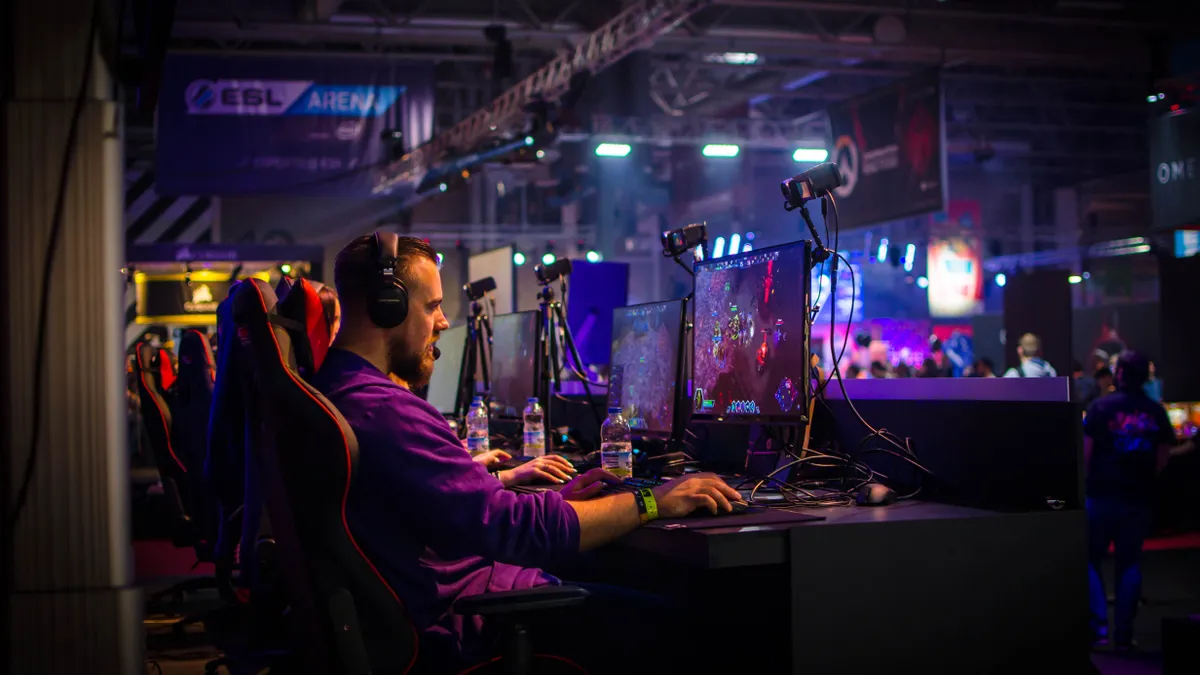Competitive video games have jumped out of the screen in recent years to captivate audiences, especially among younger crowds, for both online and in-person live events.
One esports team has been so inspired by the spike in popularity that it has commissioned the new construction of a venue with its specific, unique requirements in mind — in the goal of elevating the game day experience for fans.
The $50 milllion Fusion Arena in Philadelphia, which will be the first free-standing esports arena built in the Western Hemisphere, is set to house the Overwatch League team Philadelphia Fusion in upcoming seasons, with a target start for 2021.
The 60,000-square-foot venue, designed by arena-focused firm Populous, will feature 3,500 seats, a 10,000-square-foot training center and a broadcast studio. The venue will also host events other than Overwatch League matches, like other esports tournaments and concerts.
Groundbreaking is just a few weeks away, according to Joe Marsh, chief business officer for Comcast Spectacor’s gaming division, which owns the Fusion team, though a general contractor for the project hasn't yet been announced.
The site had a virtual reality groundbreaking at last year’s Overwatch League finals, where participants could virtually tour the layout.
Spaces like conference centers have housed events in the U.S. for Overwatch League, the association that hosts competitions for the internationally popular, first-person shooter game Overwatch. Teams from Europe, the U.S. and China face off in head-to-head matches, with the top teams taking home millions.
In order to make the venue attractive to gamers and fans, Marsh said, Comcast and its real estate developer Cordish Cos. required space for large LED screens, sophisticated sound systems, cooling systems for all the computers and monitors for catching the action in-game and in front of the computers — from the player’s perspective.
Comcast Spectacor explored retrofitting a warehouse before it realized existing space would not satisfy the requirements needed for running a major esports event, he added.
With the new construction, Marsh said Comcast Spectacor is going for a “unique game day experience” that would double as a great entertaining space. That includes club seats that have USBC drives and 300 or so seats that can be easily removed to transition the space to a concert venue.
The availability to expand and change functions of the space for other types of events was important, said Marsh, because Fusion only has 14 home matches every season.
Comcast Spectacor wanted a design that would attract young fans for a new experience, as well as capture a growing European audience which has been taking an increased interest in the U.S. esports market, Marsh said.
Populous helped design major venues like Yankee Stadium and the London Olympics, and the exponential growth in esports attracted it to the project, said Brian Mirakian, brand activation director for Populous.
There is a lot in common between designing a sporting event venue and an esports facility, Mirakian told Construction Dive, but the fan experience differs slightly, which impacts the design. Esports viewership is all about getting to see the screen, he said, whereas a sporting event’s best seat might be one where the visitor can see the court or field closest to the action.
Spectators at esports events want to customize their experience, which means providing them with a comfortable space, many screens, and options for how they view the event, Mirakian said. Combining that design with a venue built to host comedy shows, TED Talks and everything in between to attract younger fans is what Populous set out to do with Fusion Arena.
Though the Philadelphia location will be the first standalone arena of its kind in the U.S., Mirakian thinks there will be more to follow.
“The Fusion Arena is a watershed moment for competitive gaming and the live entertainment experience and will set a new standard for esports and live entertainment venues,” he said.













